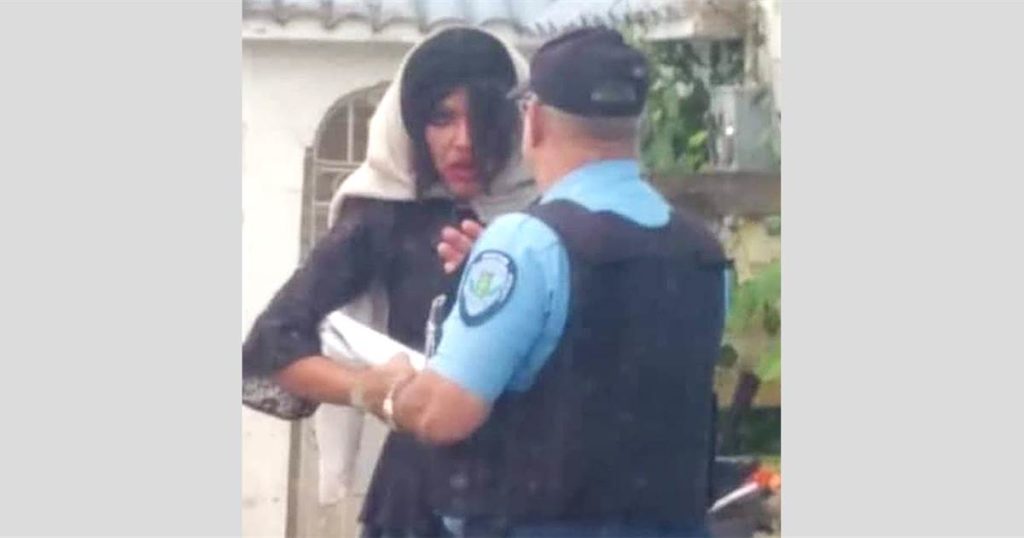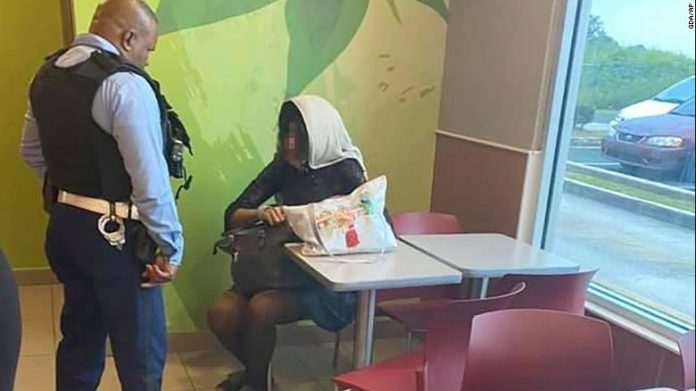Alexa Negrón Luciano was a homeless transgender woman killed in cold blood in Puerto Rico. A probable hate crime said the island’s governor — yet she refuses to condone the hate speech of the religious right and conservative politicians, who many see as the intellectual authors of this crime. The status of the police investigation remains a mystery, but the outrage of the island’s residents over a murder that shook the collective conscience just might see justice done this time.
This murder is the second violent death of a transgender or gender non-conforming person in Puerto Rico in just three months of 2020.
Alexa, who also went by Neulisa Luciano Ruiz, walked the streets of Puerto Rico’s neighborhoods in her own world. She carried a bag with a few possessions, her tall, thin body dressed in torn black tights and a skirt, her dark hair tucked under a white towel that resembled a bride’s veil.
She was known on social media, where she was mocked as a street person. Most who met her said she was soft-spoken and polite and seemed to be suffering from depression.
Alexa carried a broken rearview mirror everywhere to see who was behind her. One can only imagine how vulnerable she was. On her 29th birthday, the broken mirror didn’t protect her.
That day, Alexa needed to use the bathroom. She went into the women’s restroom in a McDonald’s in Toa Baja, 15 miles west of San Juan. Less than 12 hours later, she was dead, shot multiple times, her body left on the side of a lonely road.
Someone had called the local police and accused Alexa of using her mirror to look underneath the stalls. Police arrived to question Alexa — a picture of the cop talking to her made the rounds on social media — but she was not detained nor were charges filed.

Misinformation spread like wildfire. Alexa was falsely accused on social media of being a “peeping tom,” hunted down and finally shot to death.
The murder was apparently videoed and later posted on social media. In it, Alexa is spotlighted by the headlights of a car and then you hear male voices hurling disgusting insults at her and laughing, just before what sounds like 10 shots ring out.
“This is violence against women, without a doubt,” said New Progressive Party (PNP) Gov. Wanda Vázquez, describing the case as “sad, cruel and insensitive.” Vazquez, a former top prosecutor on the island, said the killing would be investigated as a hate crime.
“I’m looking forward to this case. I know that the police have spent long hours clearing up this crime. We are very much on the lookout for justice,” she said.
This was almost a month ago. Four teenagers were questioned, one stating they had fired at Alexa with a Gotcha gun, just to scare her. Nobody was arrested. Since then, nothing.
“The sad reality is that we don’t know where the police department’s investigation is because they refuse to publicly tell the public what they are doing and where they have gotten,” said CBS correspondent David Begnaud, who has been covering the island since Hurricane Maria devastated it in 2017.
“You know for a police department not to have a news conference in two weeks, and that being the two weeks that follow the murder, is unexplainable and quite frankly it’s unacceptable — and that’s not my opinion, that is the opinion of the people on the island,” he said.
“And the police department, the people in the press office, are very nice and quite frankly without giving the name of the individual who said this to me, there was an individual who said: David, what it is going to take is you saying something about how we refuse to do nothing to get the ball moving, he said. This is the reality that residents know and the police themselves know,” he added.
For Pedro Julio Serrano, a leading gay human rights activist in Puerto Rico, the real crime is the one perpetrated by the fundamentalist leaders, politicians, and the religious sector, who have incited things like this to happen with what he terms hate speech.
“This murder, this hate crime is a direct result of the language of hate of the political and religious leaders that are fundamentalist — like PNP legislator María M. Charbonier, like the evangelical priest (who is also running for governor) César Vázquez, like PNP Senate President Thomas Rivera Shatz, like PNP Senator Johnny Méndez, who go around saying that trans people go to the bathrooms because they are perverted and go after people,” he said.
After Alexa’s murder, Charbonier, who has opposed measures to protect women and the gay and transgender community, condemned the killing but said that transgender people should visit the bathrooms that go with their gender at birth.
“I am a woman,” she said in a radio interview. “I do not enter men’s bathrooms.” She was asked if she was a homophobe. She answered: “I can’t answer that. I don’t know.”
For his part, Vázquez, who together with Charbonier has been entrusted to write Puerto Rico’s new Civil Code, went so far as to say that in Puerto Rico crimes of hate do not exist. (Part of what Charbonier and Mr. Vázquez advocate are changes that would deny people the right to change their gender on birth certificates.)
“And these are literally their words. And even after the murder of Alexa, they insisted on that language, Charbonier as well as César Vázquez. They didn’t care that they were the intellectual authors of this murder and insisted on using that language. They were reckless,” he said.
“It is very difficult, very sad because one is engaged in a constant struggle to gain acceptance: how do I stand, how do I talk, how do I behave in front of a person so that I will be accepted. It is very difficult,” said Ivana Fred, a Puerto Rican trans activist. Fred is one of the cast members of the feature-length documentary Mala Mala, a film about the power of transformation told through the eyes of trans-identifying individuals in Puerto Rico. Directors Antonio Santini and Dan Sickles presented the passion and hardships in a beautifully filmed love letter to the trans community.
“The trans struggle is a constant because you can be a beauty queen physically but that doesn’t mean that you will not feel the implications or the weight of what it means to live like a trans person,” said Fred.
She said she was referring to the struggle to get a job, to get an education, to get access to housing so that trans people can have a traditional life.
“But when this kind of thing happens, it makes things much worse. At least I have learned that today you have to ignore them (the aggressors). You can’t respond to any taunts because the aggression has become so strong and the excuses so bad, that it is no use to try and demand respect because you will be the one that will end up worse off,” she said.
“We have a homophobic government,” Fred added. “[We] have a government that engages in hate speech.”
The tragic reality is that in Puerto Rico there are many Alexas. In 2009, a gender-fluid teenager named Jorge Stevens Lopez, who often wore women’s clothing, was decapitated, dismembered, and set ablaze.
And recently, in Moca, Yampi Mendez Arocho, a 19-year-old transgender man, was killed, making him the second violent death of a transgender or gender non-conforming person in Puerto Rico this year. Arocho was the third to be killed in the U.S. this year, as well.
“If the treatment of Yampi’s murder is added to the mismanagement of Alexa’s murder, there’s a crisis of confidence of the LGBTQ communities towards the police. They are failing to comply with their own protocols of handling cases with the trans community,” he said.
But, he insists that public pressure and indignation over the murder of Alexa “has been an earthquake that has shaken the collective conscience of Puerto Rico.”
The condemnation came from citizens, politicians, religious leaders and the media — who initially misgendered her in news reports. Puerto Rican residents are demanding the guilty be brought to justice.
Ya casi van 3 semanas y aún la Policía de Puerto Rico no hay dado más detalles en la investigación del asesinato de Alexa; sin justicia no se puede descansar en paz.
Justicia para Alexa!! @wandavazquezg Gobernadora ¿Què ha pasado con este caso?— 💫David Concepcion Maldonado⭐️💫 (@Dacomal17) March 14, 2020
Prohibido olvidar 😢El derecho a la vida es de tod@s! No importa su creencia religiosa , afiliación política , orientación sexual , raza, género! Puerto Rico 🇵🇷 no más violencia para ningún herman@! Ama , respeta, valora, se solidario, empático. Descansa Alexa 🙏 pic.twitter.com/5HKR0jPsy1
— Ray Torres (@RayTorres222) March 9, 2020
Puerto Rican rap superstar Bad Bunny wore a shirt on The Tonight Show With Jimmy Fallon honoring Alexa that read “Mataron a Alexa, no a un hombre con falda.” (“They killed Alexa, not a man in a skirt.”)
The case even was highlighted by Senator Elizabeth Warren, when she was still on the campaign trail. “I’m heartsick for Alexa and her loved ones,” Warren wrote on Twitter. “This epidemic keeps growing.”
“Now, with Alexa’s murder, people have recognized that transphobia kills,” he said.
“And the indignation that I have felt from people of all ages, of all ideologies, of all religious beliefs, even when there are a few that resist and hold on to their hate actions and speech, the vast majority of the people have condemned the crime and the deed that was committed against a clearly innocent person,” he said.
He believes this, in particular, is what will not allow that Alexa’s murder goes unpunished and that people will continue to demand justice.
“I could be wrong. I hope not, but I do hope that the demand from so many sectors for justice will penetrate someone and the truth will come out,” Serrano said.
“But, maybe I am too much of an optimist.”
Begnaud voices what many in Puerto Rico feel. “A few people have asked me why I’m covering the murder of Alexa, in Puerto Rico, so much, compared to other crimes. First of all, one crime isn’t more important than another. Second, Alexa appears to have no one to speak for her. No one has come forward, including her parents. That’s why.“
It was Maya Angelou who said:
“Words are things. You must be careful, careful about calling people out their names, using racial pejoratives and sexual pejoratives and all that ignorance. Don’t do that.”
Words, she said, have the power to penetrate. “I think they get on the walls, they get into your wallpaper, they get into your rugs and your upholstery and your clothes. And finally, into you,” Angelou wrote.
That is why we must keep writing about Alexa and the many Alexas whose murders are still unresolved. Until we stop the language of hate.
For Image credit or remove please email for immediate removal - info@belatina.com




































